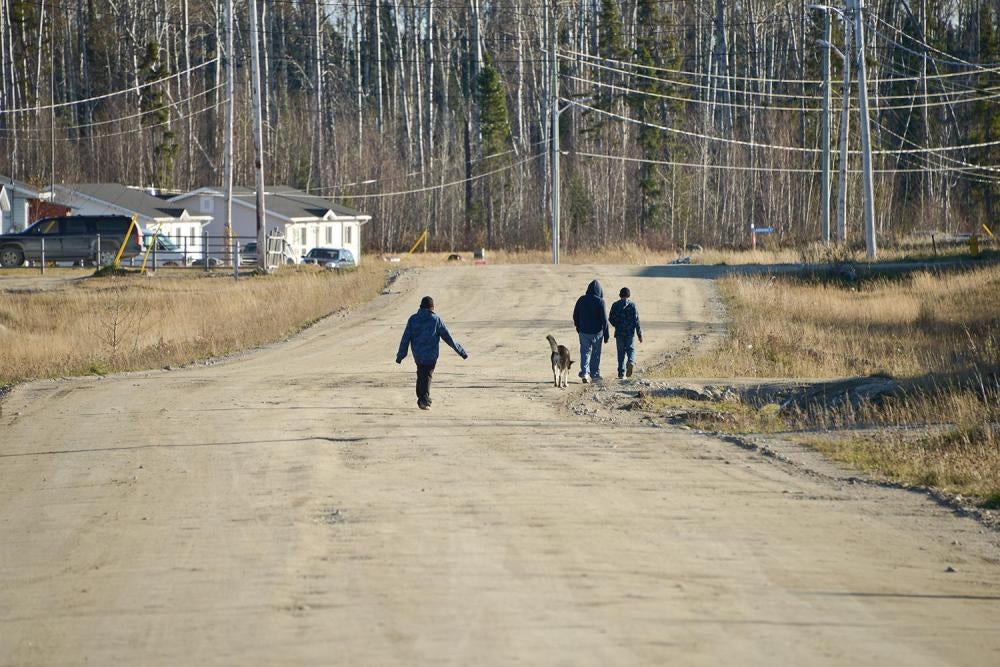 Youths walk along the road in Neskantaga First Nation, a remote community in Northern Ontario which has been on a boil water advisory since 1995.
© 2015 Samer Muscati/Human Rights Watch
Youths walk along the road in Neskantaga First Nation, a remote community in Northern Ontario which has been on a boil water advisory since 1995.
© 2015 Samer Muscati/Human Rights Watch
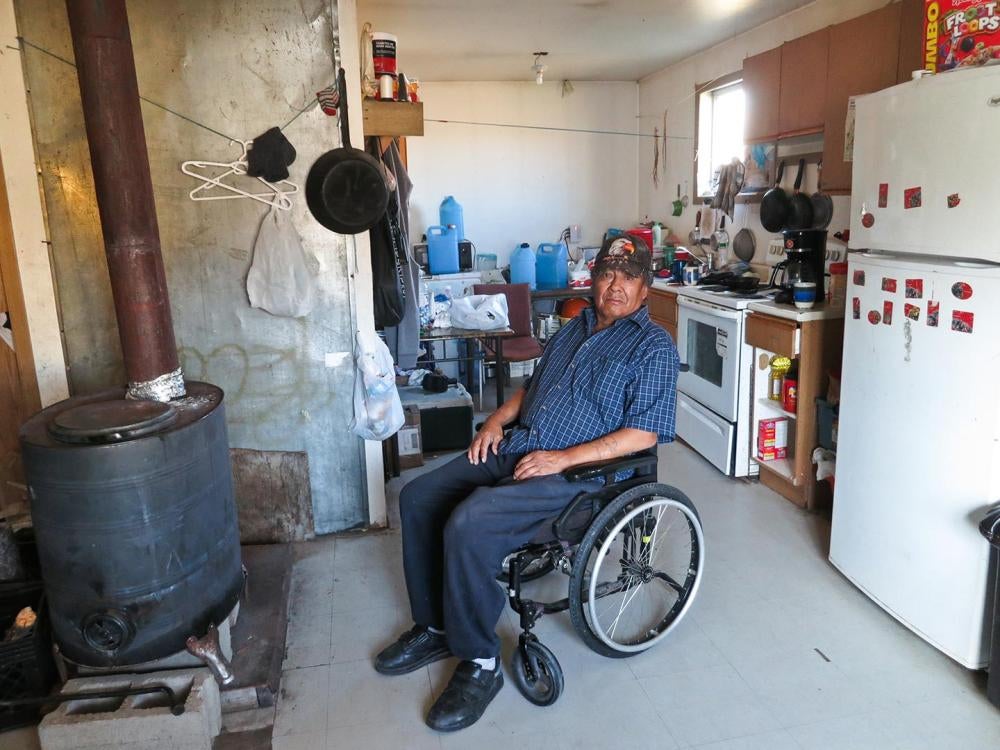 Walter Sakanee, an elder living in Neskantaga First Nation, has had difficulty fighting infections in his legs. He relies on his family members to collect safe drinking water for him in blue plastic jugs from a reverse osmosis machine located at the community’s water treatment plant. He is not able to access the plant on his own due to his physical disability.
© 2015 Samer Muscati/Human Rights Watch
Walter Sakanee, an elder living in Neskantaga First Nation, has had difficulty fighting infections in his legs. He relies on his family members to collect safe drinking water for him in blue plastic jugs from a reverse osmosis machine located at the community’s water treatment plant. He is not able to access the plant on his own due to his physical disability.
© 2015 Samer Muscati/Human Rights Watch
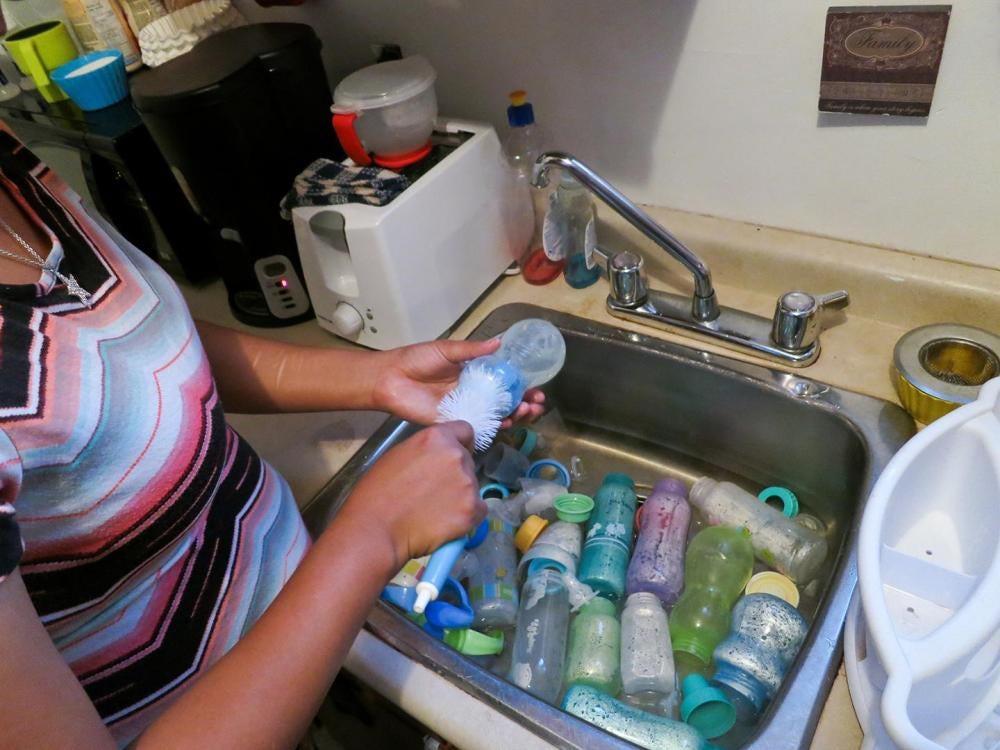 Roxanne Moonias, mother to an infant with a chronic illness, demonstrates one of the steps she takes to ensure her baby is not exposed to contaminants in the water. Roxanne lives in Neskantaga First Nation and says that it takes her an hour each time to properly wash and rinse his bottles.
© 2015 Samer Muscati/Human Rights Watch
Roxanne Moonias, mother to an infant with a chronic illness, demonstrates one of the steps she takes to ensure her baby is not exposed to contaminants in the water. Roxanne lives in Neskantaga First Nation and says that it takes her an hour each time to properly wash and rinse his bottles.
© 2015 Samer Muscati/Human Rights Watch
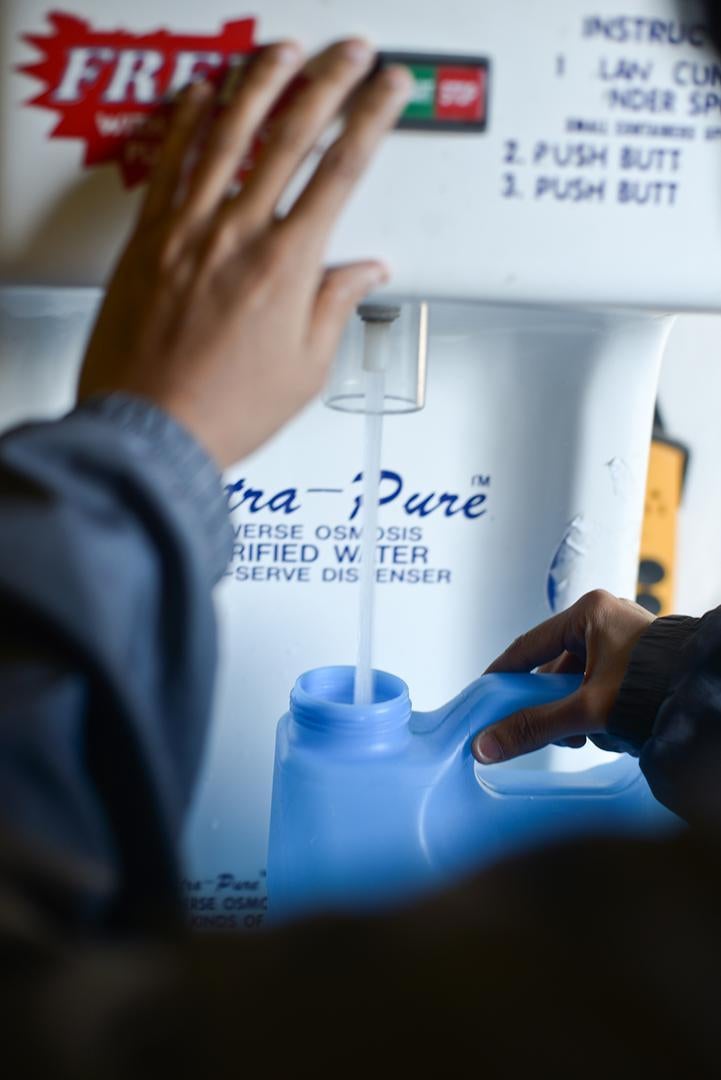 Installed in 2009, a reverse osmosis machine is the only source of clean drinking water in Neskantaga First Nation. According to government reports, the machine breaks down at least a few times a year and bottled water must be flown in for about CAD$15,000 a month.
Installed in 2009, a reverse osmosis machine is the only source of clean drinking water in Neskantaga First Nation. According to government reports, the machine breaks down at least a few times a year and bottled water must be flown in for about CAD$15,000 a month.
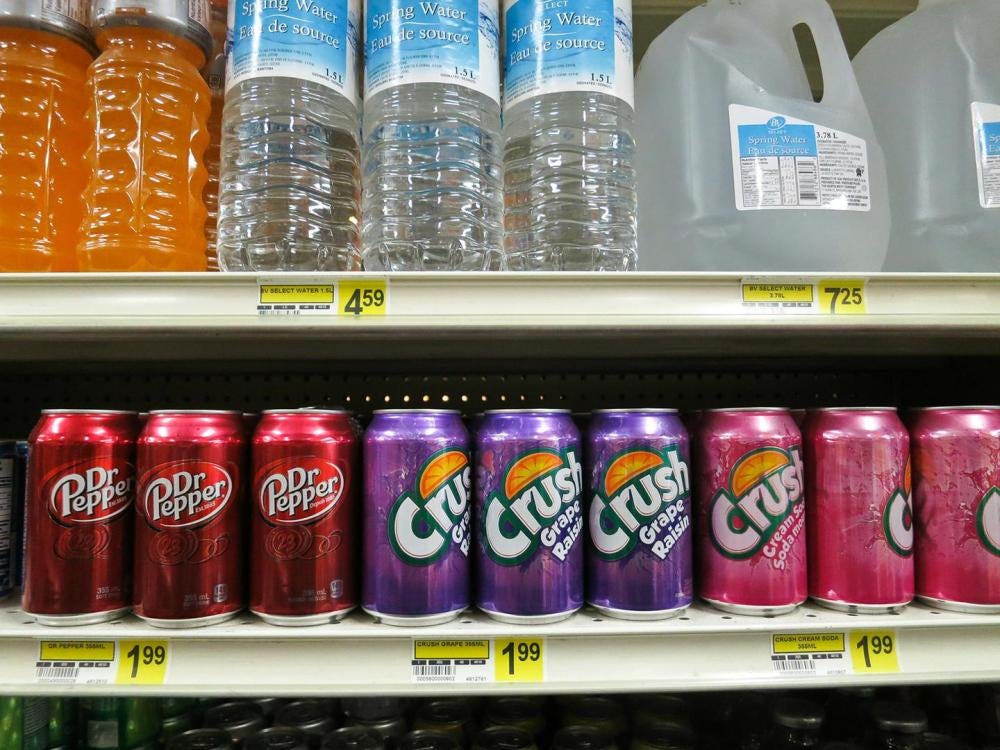 Beverages for sale in Neskantaga First Nation. Safe drinking water in the community’s only store is more expensive than sugary drinks.
© 2015 Samer Muscati/Human Rights Watch
Beverages for sale in Neskantaga First Nation. Safe drinking water in the community’s only store is more expensive than sugary drinks.
© 2015 Samer Muscati/Human Rights Watch
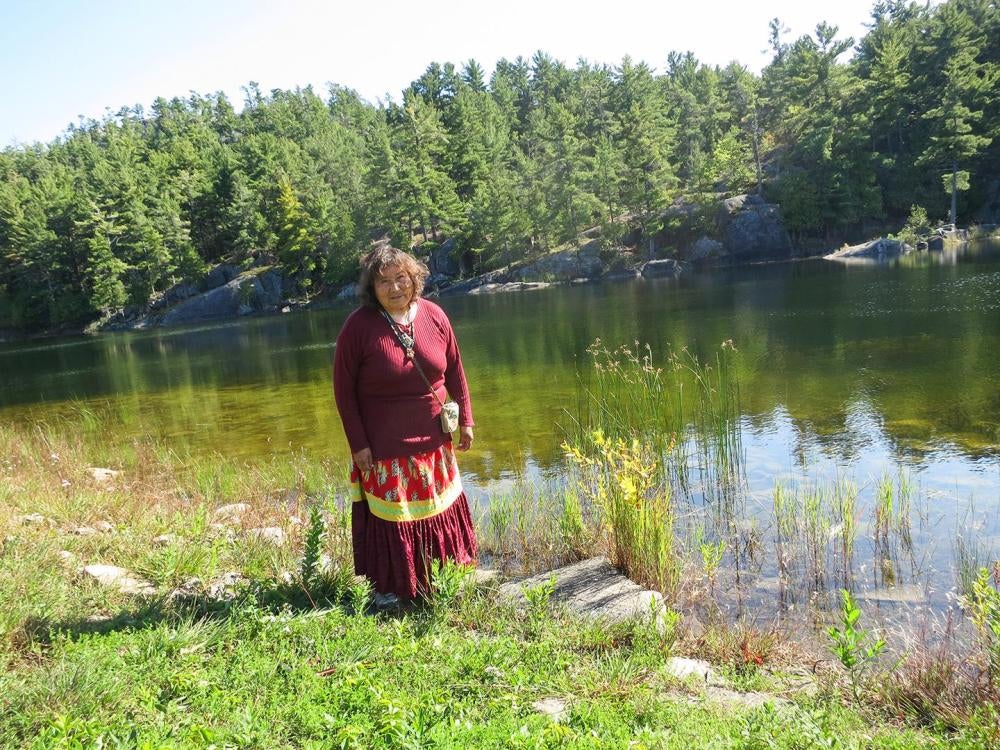 Josephine Mandamin, from the Wikwemikong Unceded Indian Reserve and known as the Water Walker, pictured after a water ceremony and elder circle in Whitefish River First Nation.
© 2015 Samer Muscati/Human Rights Watch
Josephine Mandamin, from the Wikwemikong Unceded Indian Reserve and known as the Water Walker, pictured after a water ceremony and elder circle in Whitefish River First Nation.
© 2015 Samer Muscati/Human Rights Watch
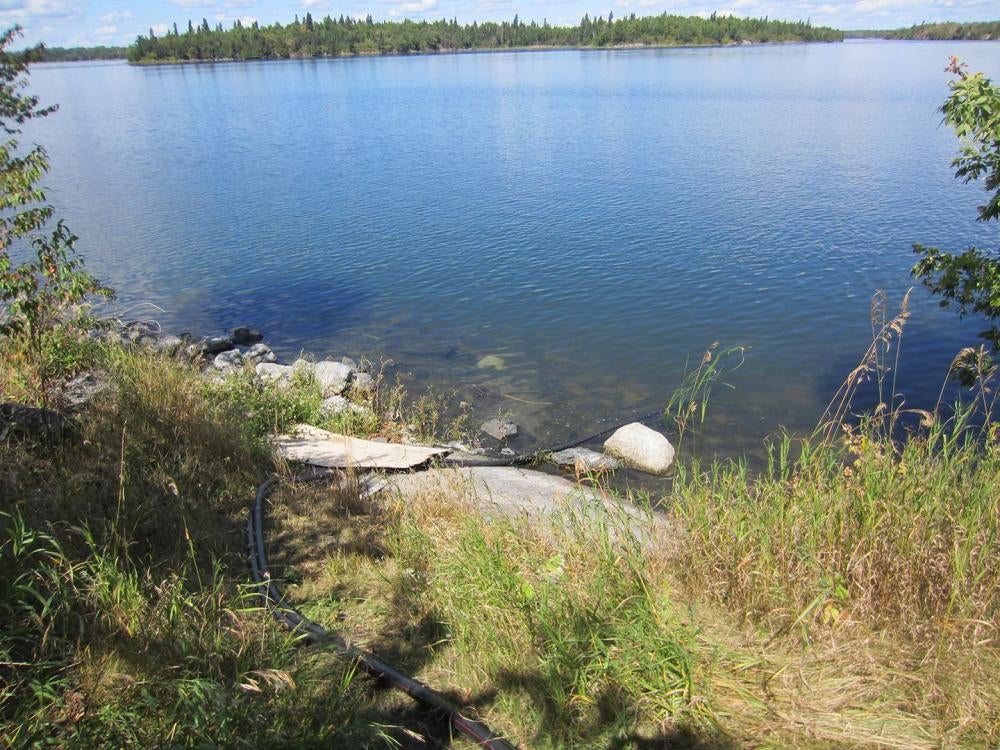 Pipe in Shoal Lake 40 First Nation which has been under a boil water advisory since 1997. The pipe delivers raw lake water to a pump house for disinfection, before it is pumped out to households for domestic use.
© 2015 Amanda Klasing/Human Rights Watch
Pipe in Shoal Lake 40 First Nation which has been under a boil water advisory since 1997. The pipe delivers raw lake water to a pump house for disinfection, before it is pumped out to households for domestic use.
© 2015 Amanda Klasing/Human Rights Watch
 Pump house in Shoal Lake 40 First Nation where raw lake water is mixed with chlorine disinfectant before being pumped out to households.
© 2015 Amanda Klasing/Human Rights Watch
Pump house in Shoal Lake 40 First Nation where raw lake water is mixed with chlorine disinfectant before being pumped out to households.
© 2015 Amanda Klasing/Human Rights Watch
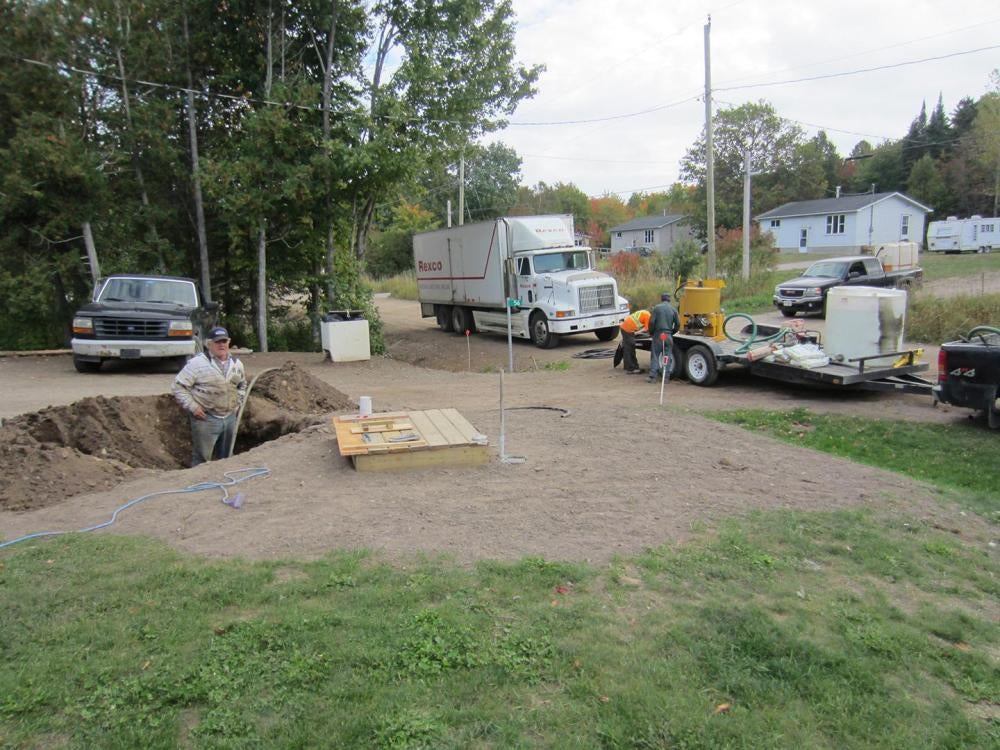 A contractor works to connect a household to a neighbor’s well in Batchewana First Nation. The household had been without water for over a year after its second well had run dry.
© 2015 Amanda Klasing/Human Rights Watch
A contractor works to connect a household to a neighbor’s well in Batchewana First Nation. The household had been without water for over a year after its second well had run dry.
© 2015 Amanda Klasing/Human Rights Watch
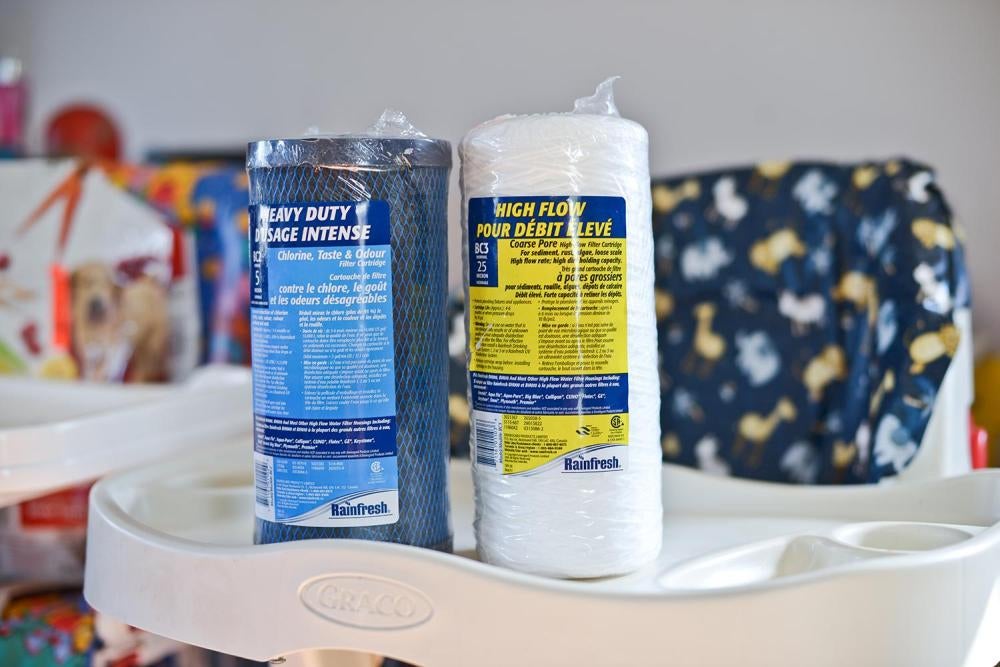 Filters provided by Batchewana First Nation to a household with poor quality well water. Without the filters the water is unusable even for bathing or cleaning; and households must always use bottled water for drinking.
© 2015 Samer Muscati/Human Rights Watch
Filters provided by Batchewana First Nation to a household with poor quality well water. Without the filters the water is unusable even for bathing or cleaning; and households must always use bottled water for drinking.
© 2015 Samer Muscati/Human Rights Watch
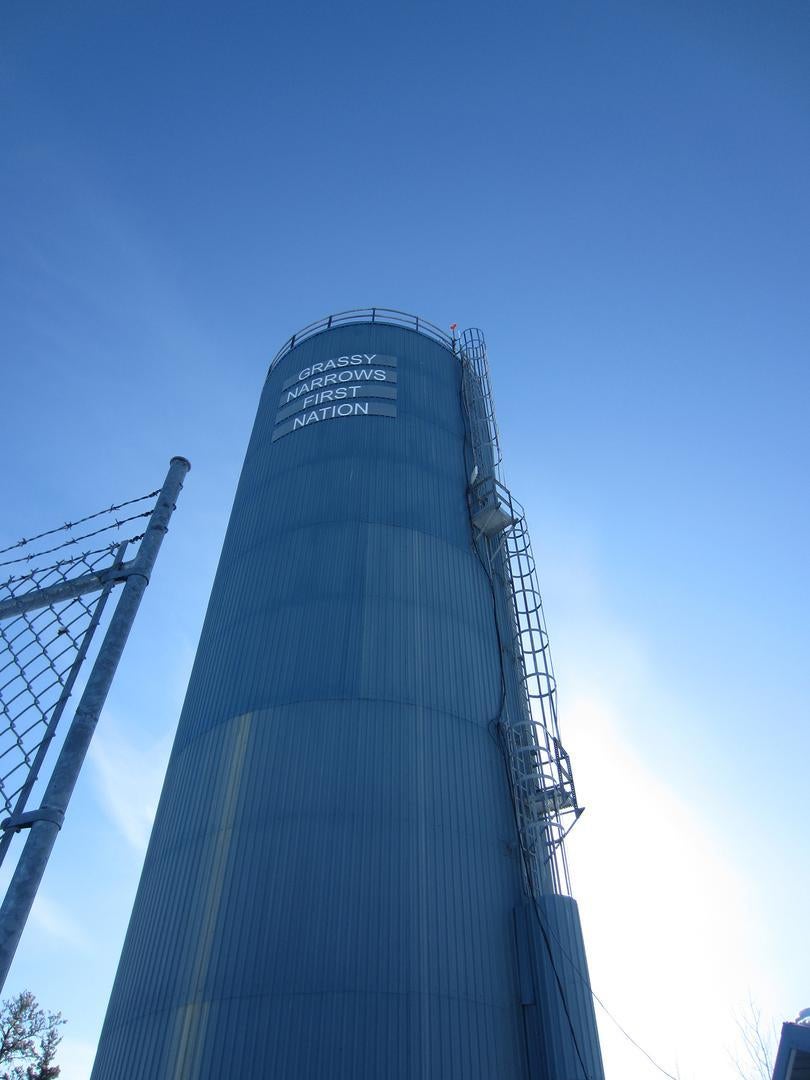 A drinking water tower in Grassy Narrows First Nation, which has been under a boil water advisory since 2014. Grassy Narrows declared a state of emergency in 2015 when leaders discovered the water was contaminated with disinfectant by-products that have been linked to cancer.
© 2016 Alexandra Kotowski/Human Rights Watch
A drinking water tower in Grassy Narrows First Nation, which has been under a boil water advisory since 2014. Grassy Narrows declared a state of emergency in 2015 when leaders discovered the water was contaminated with disinfectant by-products that have been linked to cancer.
© 2016 Alexandra Kotowski/Human Rights Watch
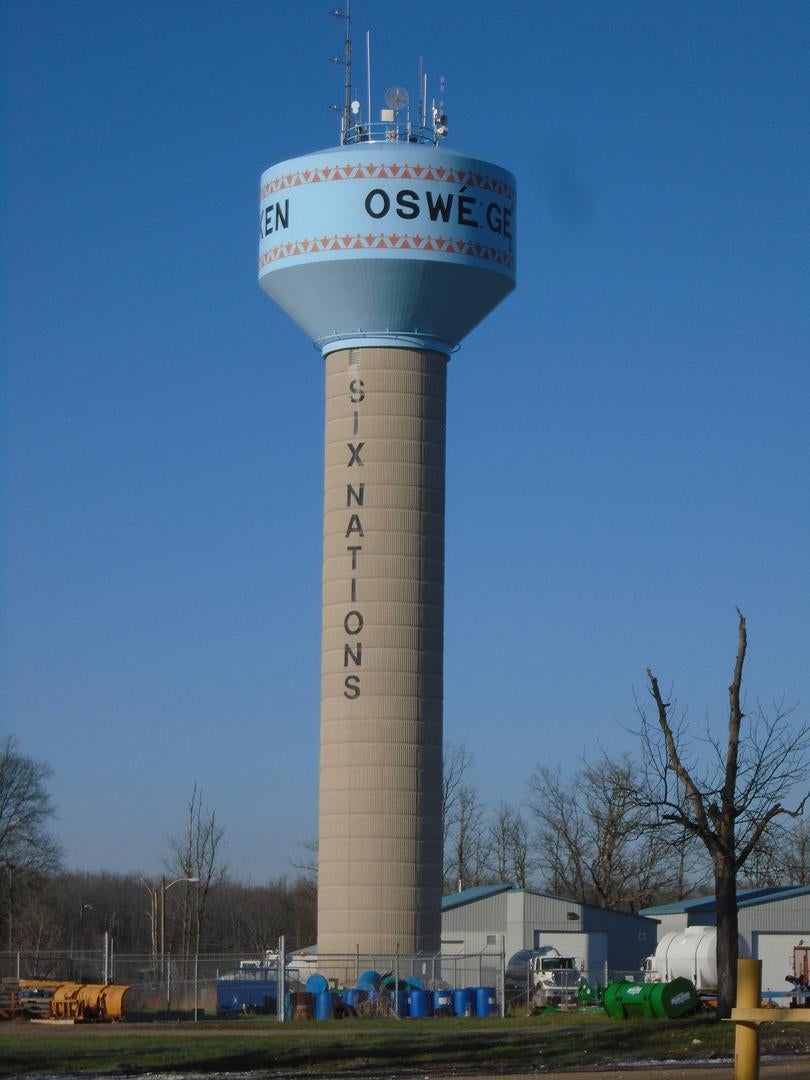 Six Nations of the Grand River (SNGR) is the largest First Nation community in Ontario, with nearly 12,000 residents on the reserve. SNGR’s new state of the art water treatment facility, built in 2013, services less than half of the households, while the majority of SNGR residents still get their water from private wells or cisterns.
© 2016 Rod Whitlow
Six Nations of the Grand River (SNGR) is the largest First Nation community in Ontario, with nearly 12,000 residents on the reserve. SNGR’s new state of the art water treatment facility, built in 2013, services less than half of the households, while the majority of SNGR residents still get their water from private wells or cisterns.
© 2016 Rod Whitlow
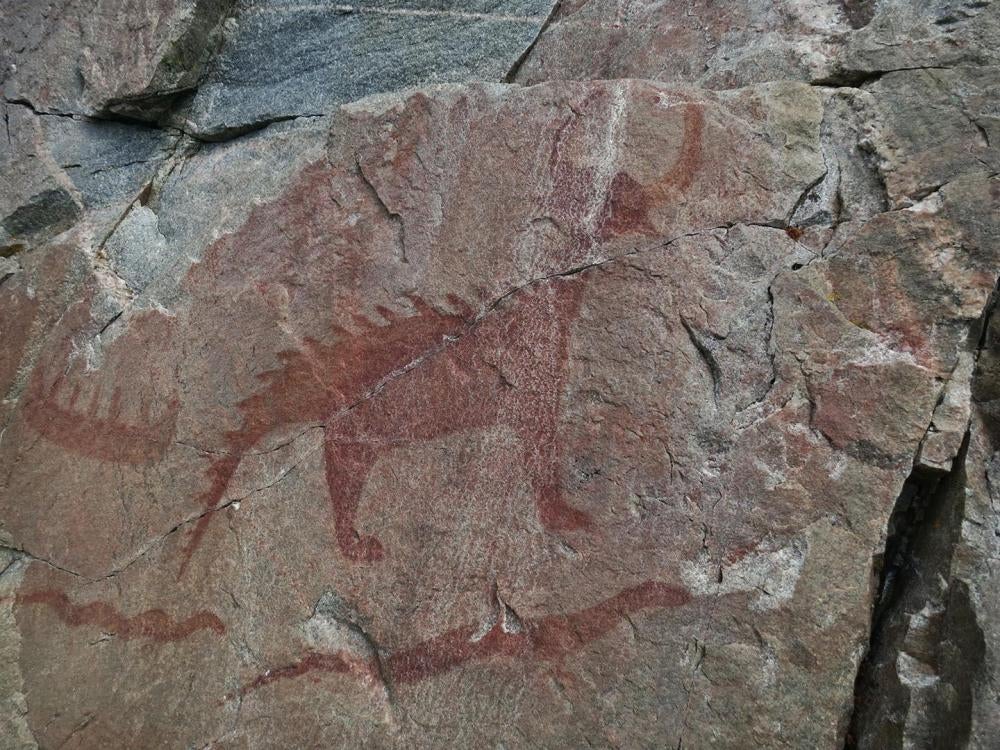 Pictograph of Mishibijiw on the shores of Lake Superior. Mishibijiw is an Ojibwe water spirit and this site is considered sacred to Batchewana First Nation.
© 2015 Samer Muscati/Human Rights Watch
Pictograph of Mishibijiw on the shores of Lake Superior. Mishibijiw is an Ojibwe water spirit and this site is considered sacred to Batchewana First Nation.
© 2015 Samer Muscati/Human Rights Watch
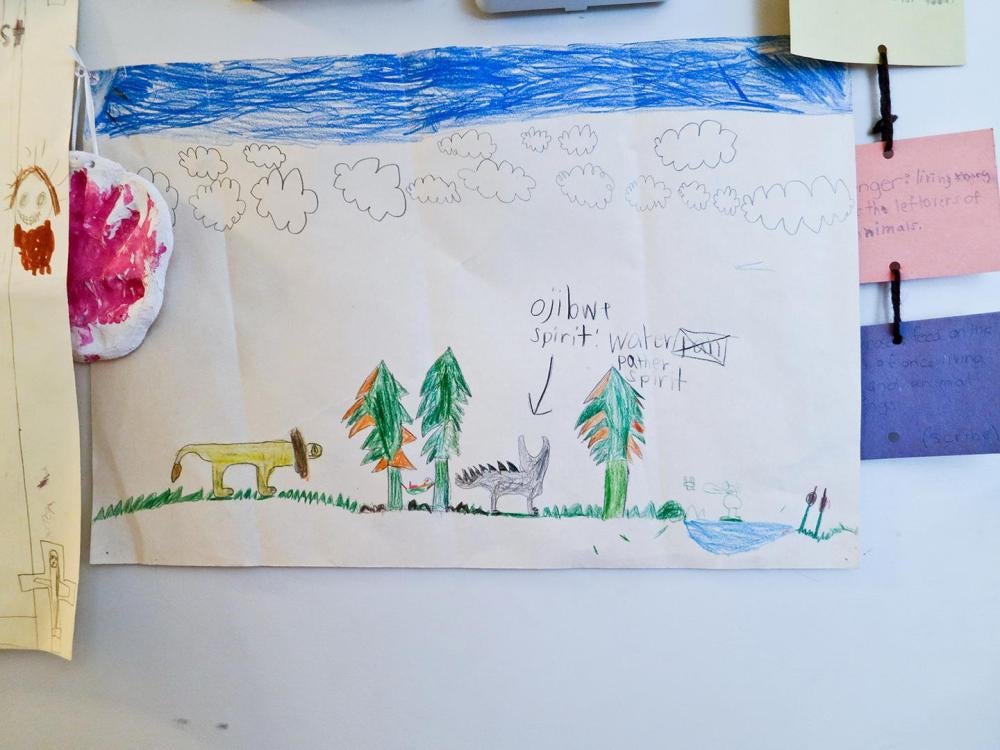 A drawing by the grandson of Chief Dean Sayers, Batchewana First Nation, highlighting the importance of Mishibijiw, an Ojibwe water spirit.
© 2015 Samer Muscati/Human Rights Watch
A drawing by the grandson of Chief Dean Sayers, Batchewana First Nation, highlighting the importance of Mishibijiw, an Ojibwe water spirit.
© 2015 Samer Muscati/Human Rights Watch
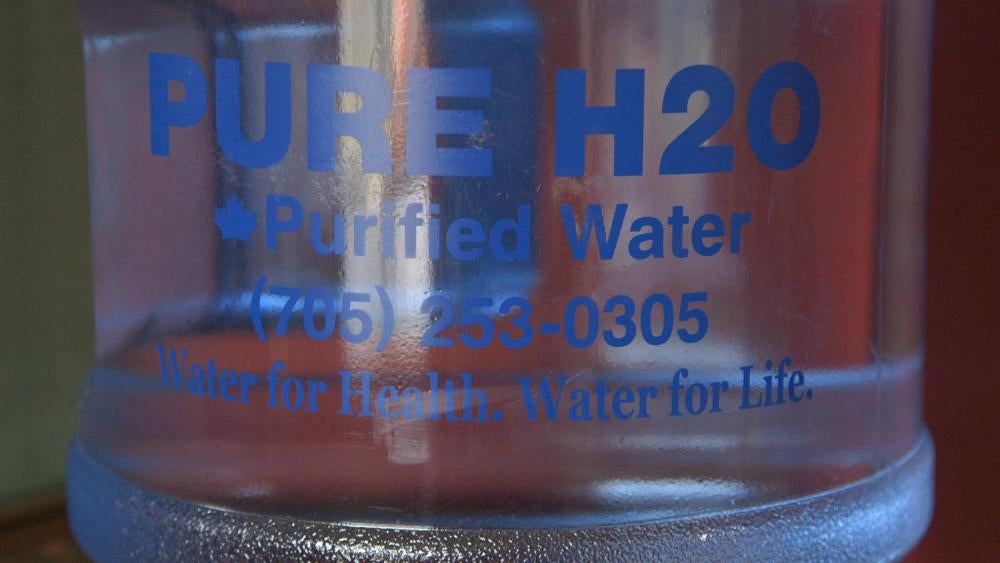 A water jug in the home of a resident of Batchewana First Nation, Ontario, Canada. Water on First Nations reserves is contaminated, inadequately treated or hard to access. May 14, 2016. Video Still
© 2016 Human Rights Watch
A water jug in the home of a resident of Batchewana First Nation, Ontario, Canada. Water on First Nations reserves is contaminated, inadequately treated or hard to access. May 14, 2016. Video Still
© 2016 Human Rights Watch
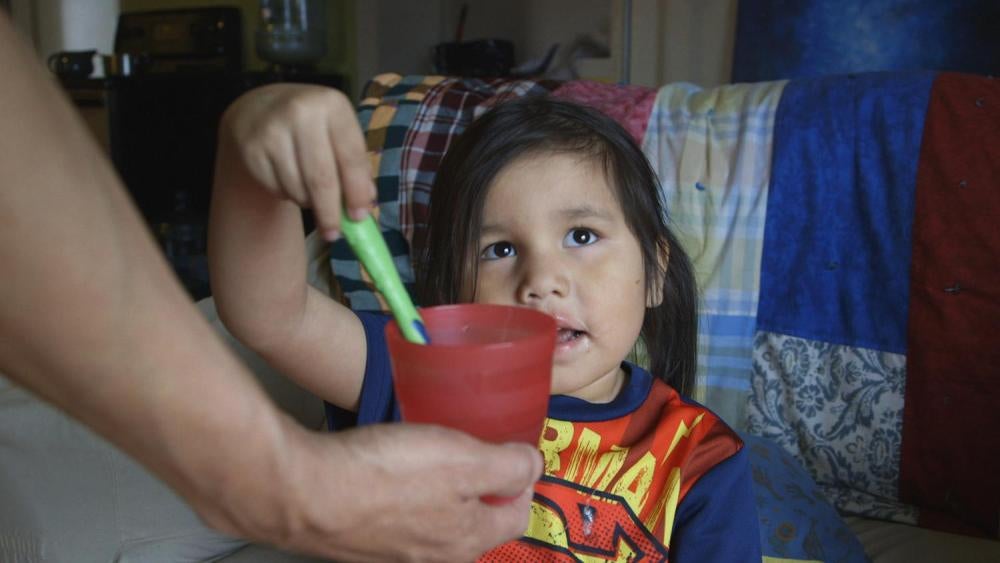 A child in Grassy Narrows First Nation, Ontario, Canada brushes her teeth with bottled water. Water on First Nations reserves is contaminated, inadequately treated or hard to access. April 14, 2016. Video Still.
© 2016 Human Rights Watch
A child in Grassy Narrows First Nation, Ontario, Canada brushes her teeth with bottled water. Water on First Nations reserves is contaminated, inadequately treated or hard to access. April 14, 2016. Video Still.
© 2016 Human Rights Watch